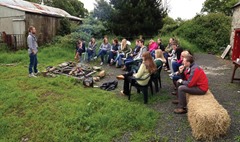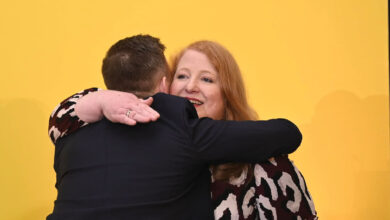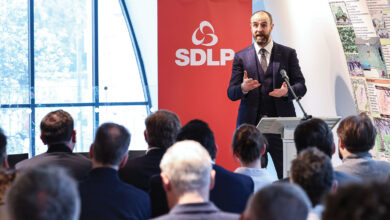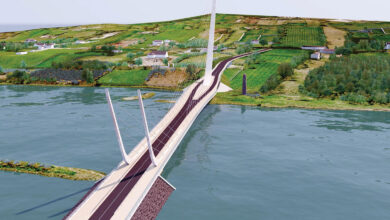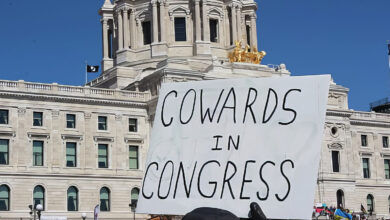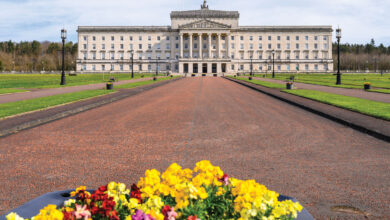Mark McFeeters
 Originally from Newtownards, Mark McFeeters is Youth Initiatives’ area manager for Downpatrick and has worked in the voluntary and community sector since leaving university. The charity carries out detached youth work, runs weekly programmes for local 11-18 year olds, and organises a summer scheme and residential cross-community camp.
Originally from Newtownards, Mark McFeeters is Youth Initiatives’ area manager for Downpatrick and has worked in the voluntary and community sector since leaving university. The charity carries out detached youth work, runs weekly programmes for local 11-18 year olds, and organises a summer scheme and residential cross-community camp.
How did you get interested in youth work?
As a young person, I regularly attended various sorts of youth clubs and around the age of 17 I became a volunteer at a local youth club as well as summer camps for young people aged 11 and up. It was through working with teams of volunteers and groups of young people that I developed a keen interest in youth work.
As a volunteer, I completed my OCN Level 2 and Level 3 in youth work and then went on to do my postgraduate diploma and masters in community youth work at UUJ. It as through this training combined with practical experience that I decided, for a career, I wanted to do what I love.
What is Youth Initiatives and what does it seek to achieve?
Youth Initiatives is a faith-based youth organisation that essentially aims to awaken hope in young people. We have been in existence for almost 25 years now, working across Northern Ireland, in East and West Belfast, Downpatrick, Banbridge and Derry. We seek to build relationships with young people mainly aged 11-25. We aim to create opportunities for all young people to reach their potential and become more of who they were made to be.
What does a typical week in your role involve?
There is definitely no ‘typical week’ in a youth worker’s schedule – as a left-brained, OCD-ridden individual, it pains me to say this – but usually I would be involved in planning and delivering a range of youth projects including schools work, street-based youth work, one-to-one mentoring and centre-based youth provision. My role is to co-ordinate our work with young people in Downpatrick and as part of this, I look after a great team of staff and volunteers in Downpatrick and would spend time working closely with them.
What are the most rewarding parts of the job?
The most rewarding aspect of my job is having the chance to work with some great people and see them become more of who they were made to be. Young people are often given a bad press in Northern Ireland but, whilst this perception exists, young people are without a doubt our most valuable asset. I love to see young people accept who they are, understanding what they were made for, what their purpose is, and striving to live that out positively.
I love to work with our staff and volunteers and have a real motivation to see others grow and reach their potential and seeing my colleagues, our younger volunteers and our young people do this excites me.
Working in this sector can be volatile and uncertain. For every youth work session I’m involved in, I have that pre-session stress and fear of “what if nobody turns up?” This can be challenging, particularly if nobody actually turns up!
This, however, is the nature of what we do. We don’t and can’t force young people to come to us, or our projects. It’s purely voluntary, but, we always try to live in the hope that young people like what we do.
The other challenge I find myself facing is without a doubt the uncertainty around funding for projects and staff. This constant environment of uncertainty, whilst it does keep you on your toes, can be hard to overcome mentally. There are many, many changes happening in the youth work world in Northern Ireland, particularly where finance and funding is concerned, and as a (relatively) young man with a family this is a challenge.
In your experience, what are young people’s main aspirations for a shared future?
Young people, in my experience, genuinely want a better future for themselves individually, their families and their communities. I don’t believe any young person’s dream is to be violent, anti-social or in trouble, and I don’t believe young people want a divided society. Some have a ‘learned’ or ‘passed on’ view of ‘them ones’, which is conditioned through generational influence but, most, if not all, young people aspire to live in safety, security, peace and in a land that is full of hope, possibilities and opportunity.
How do you spend your free time?
My free time is largely spent with my family as a husband and a father, and as such free time is certainly a rarity and luxury. With the unique little snippets of free time I get, as a running addict of around 12 years, I am usually found outside pounding the roads of Belfast. I am an avid Chelsea fan (pre-2003 of course), a keen reader and musician.

